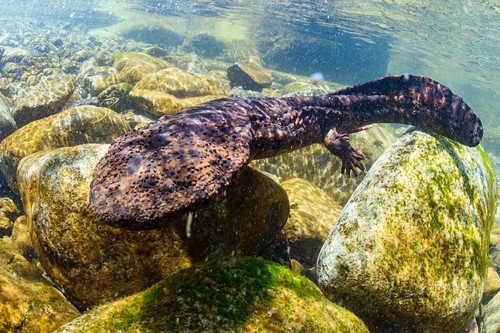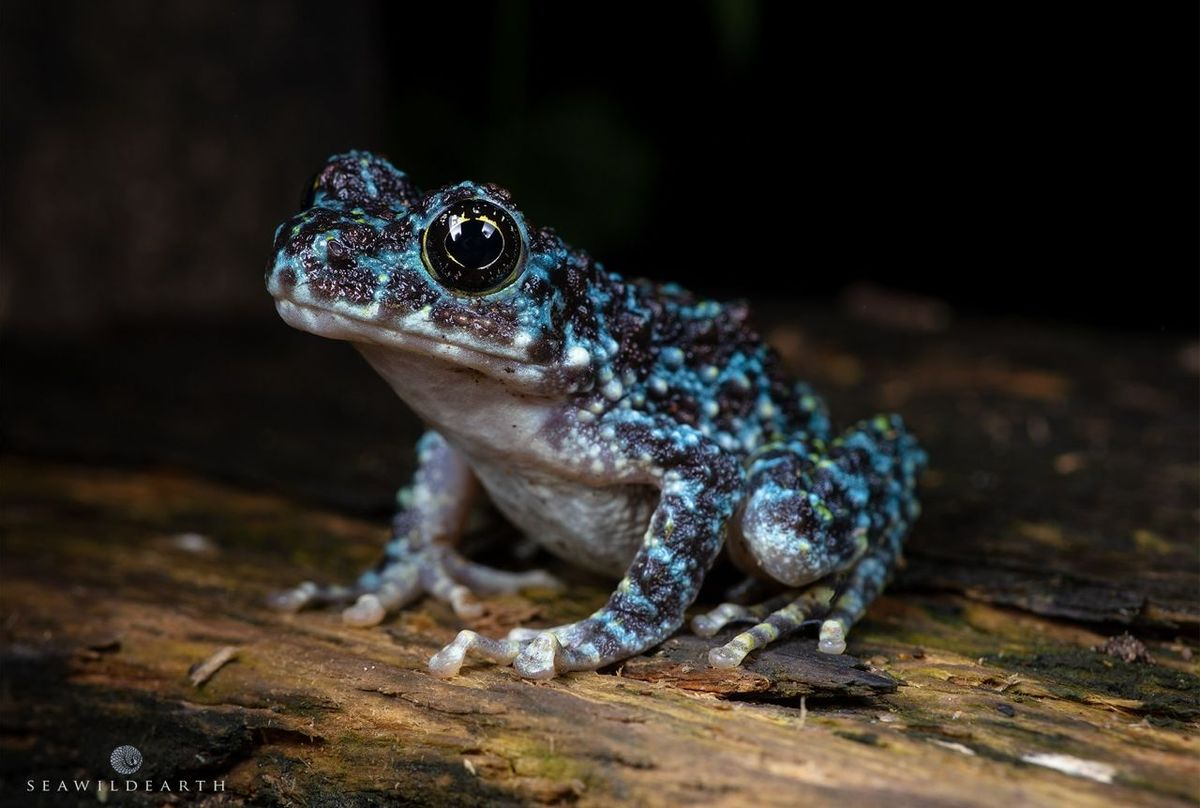Leaf-nosed Lizard (Ceratophora tennentii), Sri Lankan Green Pitviper (Trimeresurus trigonocephalus), Linda's Treefrog (Hyloscirtus lindae)
Herping Tours for 2026/27

Operations Manager
17th February 2021 (updated March 2025)
Colombia is nestled in the north-west of South America and is bordered by Panama, Venezuela, Brazil, Ecuador and Peru. Dominated by the Andes, much of Colombia is mountainous; its mega biodiversity enriched by Caribbean and Pacific coastlines, Amazon rainforest and Llanos (plains). Though it lies in the tropics, Colombia’s wide altitudinal range creates complex climatic variation. Together, this range in habitats and climates, combined with untouched forests inaccessible for many years, make Colombia one of the world’s top destinations for a tour focussed on reptiles and amphibians.
Indeed, the reptile- and amphibian-life in Colombia is astounding. Colombia has the second largest richness of amphibians in the world, hosting a mind-blowing 820 species of which over 390 species are endemic. Here we can find some of the most attractive frogs and toads on the planet, species such as the highly variable but ever-spectacular Harlequin Poison Frog and the much-sought Black-legged Poison Frog. Many of the commonly found treefrogs and glassfrogs are also jewels of the rainforest. Colombia has one of the richest diversities of reptile-life on earth, with over 600 species found here, of which 174 species are endemic. Even some of Colombia’s most common reptiles are intricately beautiful, species such as Rainbow Lizard, Yellow-headed Gecko, Red-footed Tortoise, Mesoamerican Slider and Giant Parrot Snake. In addition to these common species, there are plenty more vibrant species to be discovered including Eyelash Viper, Common Monkey Lizard, Forest Flame Snake and a multitude of spectacular Anolis and Ameiva lizards.

Harlequin Poison Frog (Oophaga histrionica)

Harlequin Poison Frog (Oophaga histrionica)
It is of course impossible to visit Japan without immersing in its unique culture and traditions and we'll relish the remainder our time on Honshu enjoying a sensational experience of Japan's long isolation from foreign influence in Tokyo and Kyoto, and we'll make visits to shrines, zen temples, and get a real taste of the Japanese way of life.
The second part of the trip takes us on a exciting exploration of Okinawa Hondo. In the lush sub-tropical forests of the island's Yambaru National Park, we'll search for Anderson’s Crocodile Newt, Ryuku Black-breasted Leaf Turtle, Kuroiwa's Ground Gecko, Ishikawa’s Frog, Okinawa Habu, and many other species.

Japanese Giant Salamander (Andrias japonicus)

Ishikawa's Frog (Odorrana ishikawae) © Mark Thorpe
Making our way through volcano-dotted landscapes to the east, this tour provides unique opportunity to visit the Naturetrek Reserve in Baños. This cloudforest habitat, protected by donations of over £400,000 from Naturetrek, is home to such special species as Andean Cock-of-the-rock, Spectacled Bear, and a species named in recognition of our role in protecting its habitat, Naturetrek Leaf Frog. Monkey frogs, clown frogs and glassfrogs are but few of the amphibian families we can expect to see from Ecuador’s incredible 630 amphibian species. Caiman, vipers, anaconda, freshwater turtles and a catalogue of lizards make up a handful of the reptilian contingent that make for a fascinating tour of Ecuador in the company of an experienced photographer herpetologist guide.

Pinocchio Lizard (Anolis proboscis) © Xavier Muñoz
Namibia must be considered one of the finest places in the world to find and photograph reptiles, with over 200 species (of which almost a quarter are endemic) found in some of the most breath-taking habitats on earth. It is also home to some of the world's most photogenic reptiles, inhabited by Web-footed Gecko, Namaqua Chameleon, and the stunning adders in the genus Bitis, which are numerous in Namibia. Exploring this magnificent country using a state-of-the-art custom 4x4 cruiser, we’ll travel in comfort in search of Namibia’s specialties which include Peringuey’s Adder, Horned Adder, Wedge-snouted Desert Lizard, cobras and Anchieta’s Dwarf Python. The monotypic Welwitschia, a living fossil and one of Earth’s most extraordinary plant species, towering red-sand dunes, Quiver Trees and the skeleton trees at Deadvlei make for an itinerary packed with photographic opportunities.

Namaqua Chameleon (Chamaeleo namaquensis)
Borneo is renowned for its amphibian and reptile biodiversity, as well as its suite of birds, insects, flora, and mammals. Approximately 300 reptile species have been recorded from the island of Borneo and approximately 150 species of amphibian, of which over two thirds are endemic. On this exciting itinerary we’ll explore Borneo’s habitats, utilising night walks and drives at every opportunity to search for the island’s spectacular diversity of wildlife, the reptile- and amphibian-life consists of such special species as Kinabalu Dragon, Malcolm’s Pit Viper, King Cobra, Red-headed Krait, gliding lizards, Harlequin Tree Frog and many others.
Our itinerary begins in Mount Kinabalu National Park before heading east to Poring Hot Spring, a hotspot for a selection of reptiles that are otherwise difficult to find in Borneo including three species of pit viper, Giant Gliding Lizard and Bornean Horned Frog. At Sepilok a plethora of snake species can be found including the world’s longest snake, Reticulated Python and the world’s largest venomous snake, King Cobra. Our final days in Kinabatangan and Danum Valley will be no less exciting, introducing such species as Estuarine Crocodile, Bornean Leaf-nosed Pit Viper and the wonderful Wallace’s Flying Frog. A snippet of other vertebrate fauna which can be enjoyed includes hornbills, broadbills, Sun Bear, Bornean Orangutan, Western Tarsier and Pygmy Elephant!
Our visit to Borneo on this itinerary helps to provide funding to our partners in Borneo for several community projects.

Five-banded Gliding Lizard (Draco quinquefasciatus)

Bornean Horned Frog (Megophrys nasuta) © C. Ryan
We begin this unique tour in the port city of Cape Town joining our local expert herpetologist guide, who authors the region’s field guide. From Cape Town we take a route as far north as Augrabies National Park, the location of Sir David Attenborough’s flat lizard scene in the BBC series 'Life in Cold Blood’, and we too can enjoy watching this vibrant, acrobatic species here. On this tour we shall discover a range of habitats in search of iconic herpetofauna including Armadillo Lizard, Cape Cobra, Puff Adder and Namaqua Rain Frog. Little-known but fascinating species include Namaqua Dwarf Adder – the world’s smallest adder – the incredibly photogenic Cape Coral Snake, the critically endangered Geometric Tortoise and the splendid Cape Dwarf Chameleon. A huge range of other snakes, lizards, tortoises, and amphibians make for an engrossing tour, limited to just six participants, with an expert guide.

Armadillo Lizard (Ouroborus cataphractus) © Tyrone Ping
Southern Morocco is an exciting destination for a holiday focussed on reptiles and amphibians. A great diversity of habitats in close proximity to one another allow for an impressive number of species to be seen in a short time, with humid tropical specialities including Mediterranean Chameleon, Puff Adder and Egyptian Cobra living only an hours’ drive from xerocole specialists such as the Desert Horned Viper, Moroccan Spiny-tailed Lizard and Desert Monitor. With diurnal and optional nocturnal excursions at every opportunity, we'll go in search of some fascinating species with an enviable list of species the likely outcome! With few tourists making it south of Agadir, we’ll get a true taste of southern Morocco, staying in comfortable, authentic, accommodation with en suite facilities throughout. An optional 3-day extension offers the chance to enjoy the High Atlas region of Oukaïmeden, home to such specialities as Mountain Viper, Atlas Day Gecko, North African Eyed Lizard and Moroccan Painted Frog.

Egyptian Cobra (Naja haje) © Dan Kane
An exploration of the Republic of Albania is a tantalising prospect for the naturalist and indeed especially for anyone with an interest in seeing Europe’s reptile and amphibian species. Pristine rivers, intact habitats and traditional farming methods have maintained wildlife in long-forgotten densities. In this wonderful destination we shall go in search of delights such as Greek Meadow Viper, Meadow Viper, and Albanian Pool Frog – 3 endangered species – alongside a plethora of over 55 species which includes all three species of European tortoise, two species of terrapin, Fire Salamander and an impressive range of frog, lizard, and snake species. A visit to Maligrad Island, surrounded by pristine waters, will be unforgettable with incredible densities of snakes and lizards. The time spent at Nemërçkë and Korab Mountains is equally special with delightfully scented herbs, butterflies in abundance, breathtaking landscapes and fantastic herpetology prospects providing sheer joy for the senses.

Fire Salamander (Salamandra s. salamandra) © Ilir Shyti
From our base, at the very comfortable and charming Mortons Manor in the picturesque town of Corfe Castle, we'll join Amphibian and Reptile Conservation Trust experts to seek Britain's most beautiful and elusive native reptile and amphibian species, as well as visiting established colonies of introduced species. This wonderful short break gives a fantastic opportunity to discover all of Britain’s reptile species including all three native snake species; Adder, Grass and Smooth Snake, as well as all three native lizard species: Sand Lizard, Common Lizard and Slow Worm. For those who wish, there’s also opportunity to search ponds by torchlight for the UK’s three native newt species: Great Crested, Smooth and Palmate, enjoying these species up close, learning about their ecology and taking photographs.

Adder (Vipera berus)
Within Europe there is a standout place for its high diversity of reptile and amphibian species – Greece’s Peloponnese Peninsula. A superb 46 species of reptile and amphibians occur here. Here is the only place in Europe where you can find African Chameleon, and we’ll have multiple opportunities to find this species during our stay. Along with many true endemics such as Greek Rock Lizard and Greek Algyroides, which inhabit the immediate surroundings of beautiful waterfalls, there are many other Greek specialties found here such as Marginated Tortoise and Limbless Skink, which occur almost exclusively on the Peloponnese. In addition to the range of species that occur here, the unspoiled nature and the densities of animals that are associated with it are truly impressive. A chorus of anurans and a crystal-clear stream full of curious pond terrapins are experiences we will have the rare privilege of enjoying in Europe. Add stunning mountains, wonderful flora, empty beaches, ancient chapels, friendly people and mouth-watering Mediterranean cuisine and it’s easily imagined how this will be an unforgettable Greek adventure.

African Chameleon (Chamaeleo africanus)
Naturetrek have been crafting expertly-guided group and tailormade wildlife holidays and cruises to all seven continents since 1986. On all of our holidays, you can be assured that our expert team will enable you to experience and enjoy the best of the world's wildlife and natural spectacles in as comfortable and rewarding a manner as possible. Drawing on decades of knowledge built up from operating bird, mammal, botany, butterfly and other wildlife tours, and combining this with in-house herpetology expertise, we are delighted to be able to offer the opportunity to join expert field herpetologists in search of some of the world’s finest reptile and amphibian experiences, on a range of herping tours across the planet.
Group flights for our herping tours typically depart from London, but we are very pleased to help make arrangements for you to join our holidays from any location worldwide. Additionally, should you be interested in taking a herping holiday to a destination which is not listed in our current portfolio, please do get in touch and we'll be very pleased to discuss options with you.


 Loading search...
Loading search...